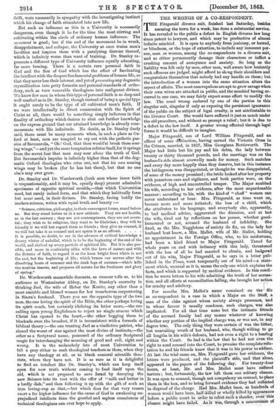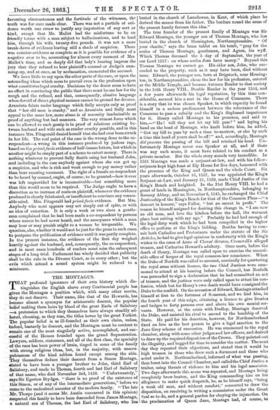THE WRONGS OF A CO-RESPONDENT.
THE Fitzgerald divorce suit, finished last Saturday, besides 1 amusing the town for a week, has done a substantial service. It has revealed to the public a defect in English divorce law long since patent to lawyers, and which may be productive of almost infinite mischief. It is open to anybody from jealousy, or hatred, or blindness, or the hope of extortion, to include any innocent per- son, man or woman, among the co-respondents in a divorce suit, and so either permanently damage their characters or inflict a crushing amount of annoyance and anxiety. So long as the liability was felt only by men, other men, well aware how leniently such offences are judged, might afford to shrug their shoulders and congratulate themselves that nobody had any handle on them; but the introduction of a woman into the same situation alters the aspect of affairs. The most unscrupulous are apt to grow savage when their own wives are attacked in public, and the mischief having oc- curred in one case, we may fairly expect some effort to modify the law. The cruel wrong endured by one of the parties in this singular suit, singular if only as exposing the persistent ignorance of the public on the subject of legal cruelty, is not attributable to the Divorce Court. She would have suffered it just as much under the old procedure, and without so prompt a relief; but it is due to a defect in the law itself. A greater wrong effected through legal forms it would be difficult to imagine.
Major Fitzgerald, son of Lord William Fitzgerald, and an officer of some atinction, having earned the Victoria Cross in the Crimea, married, in 1857, Miss Georgiana Bettisworth. The Major had little but his pay and his debts, the lady between twenty or thirty thousand pounds, and the marriage was on the husband's side almost avowedly made for money. Such matches end every day more happily than they deserve, but in this instance the bridegroom was disappointed, or thought he was disappointed, of some of the money promised ; the bride looked after her property with penurious care and vigilance, and both parties were, on the evidence, of high and uncontrolled temper. The Major snubbed his wife, according to her evidence, after the most unpardonable manner; according to his, with the kind of " chaff " women can never understand or bear. Mrs. Fitzgerald, as time went on, became more and more irritated; the loss of a child, which she attributes to his language, and everybody else, apparently, to bad medical advice, aggravated the disunion, and at last the wife, tired out by reflections on her person, whether good- humoured or not, accused the husband of infidelity. She fixed, as the Mrs. Naggletons of society do fix, on the lady her husband best knew, a Mrs. Mallet, wife of Mr. Mallet, holding an appointment in the Foreign Office, who, to his misfortune, had been a kind friend to Major Fitzgerald. Taxed for whole years on end with intimacy with this lady, threatened with the loss of all he had married to obtain, and badgered out of his wits, Major Fitzgerald, as he says in a letter pub- lished in the Times, went temporarily out of his mind—a state- ment which, unusual as it is, seems the only one Which explains the facts, and which is supported by medical evidence. In this condi- tion he wrote letters to his wife admitting the truth of her accusa- tion, and all efforts at reconciliation failing, she brought her action for cruelty and adultery.
For months Mrs. Mallet's name remained on the ' file as co-respondent in a case in which a Major on the Staff, a man of the digs against whom society always presumes, and in whose favour it usually condones, such charges, was also implicated. For all that time none but the intimate friends of the accused family had any means whatever of knowing whether any portion of the implied charge was, or was not, in any degree true. The only thing they were certain of was the bitter, but unavailing wrath of her husband, who, though willing to go all lengths in his wife's defence, had not even a right to a hearing within the Court. So bad is the law that he had not even the right to send counsel into the Court, to promise the complete refu- tation he and his friends knew that it was in his power to adduce. At last the trial came on, Mrs. Fitzgerald gave her evidence, the letters were produced, and the plaintiff's side, and that alone, appeared in the papers of the following day. For twenty-four hours, at least, Mr. and Mrs. Mallet must have suffered torture ; but, fortunately, the law left them one solitary chance. It was open to counsel, though not compulsory on counsel, to place them in the box, and to bring forward evidence they had collected in disproof of the charge. Had Mrs. Mallet been, as hundreds of women would have been, half-killed or wholly killed by appearance before a public court in order to rebut such a slander, even this chance might have failed. As it was, through a concurrence of
favouring circumstances and the fortitude of the witnesses, the truth was for once made clear. There was not a particle of evi- dence worth one straw to justify any imputation of any sort or kind, except that Mr. Mallet had the misfortune to be on friendly terms with a man subject to hallucinations, and to lend him, through his wife, twenty-five pounds. It was not a mere break-down of evidence leaving still a shade of suspicion. There was counter-evidence as complete as it is possible for evidence of a negative ever to be, accounting for almost every moment of Mrs Mallet's time, and so deeply did that lady's bearing impress the jury that they refused to hear plaintiff's counsel or Judge's sum- ming-up, and at once, as by acclamation, exonerated the accused.
We have little to say upon the other parts of the case, or upon the astounding ideas which seem to prevail even in the profession upon
what constitutes legal cruelty. Decisions by the dozen seem to have no effect in convincing the public that there must be one law for the rough and the refined, and that, consequently, abusive language when devoid of direct physical menace cannot be ground for divorce. Araminta faints under language which Sally accepts only as proof that "her old man is cranky," and as Araminta and Sally must appeal to the same law, mere abuse is of necessity inadmissible as proof of anything but bad manners. The very utmost force which can be allowed to such gossip is in proof of relations existing be- tween husband and wife such as render cruelty possible, and in this instance Mrs. Fitzgerald denied herself that she had ever been struck in her life. The real point of the case is the wrong done to the co- respondent—a wrong in this instance produced by jealous rage, based on the prima facie evidence of half-insane letters, but which in another might be simply part of a scheme to extort money. There is nothing whatever to prevent Sally Smith suing her husband John, and including in the case anybody against whom she can get up a suspicion, and who is rich and weak enough to pay money rather than bear sneering comment. The right of a female co-respondent to be heard by counsel, ought, of course, to be granted—how it ever was left nnprovided for is inconceivable—but something more than this would seem to be required. The Judge ought to have a discretion as to increase of costs on plaintiff, whenever the evidence produced is clearly fabricated, or insufficient to convince any reason- able mind. Mrs. Fitzgerald had primti facie evidence. But Mrs. Anybody who next appears may act simply out of spite, or with an idea of extortion. It is only a week or two since a gentle- man complained that he had been made a co-respondent by persons whose names he had never heard, and the annoyance which a man may bear or may punish might to a woman be irreparable. We question, also, whether it would not be just for the press in such cases to postpone the publication of evidence until it was partly complete. In the present instance, the evidence of the first day weighed heavily against the husband, and, consequently, the co-respondent, and in most cases hundreds of readers must miss the subsequent stages of a long trial. Parliament has wisely decided that publicity shall be the rule in the Divorce Court, as in every other ; but the evils which attend a sound system might be reduced to a aninimum.































 Previous page
Previous page